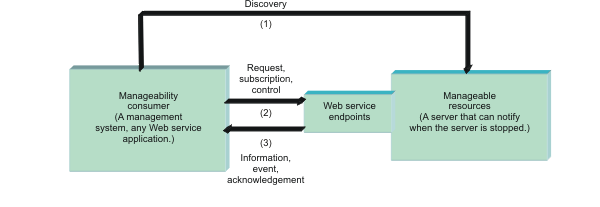Web Services Distributed Management resource management
Web Services Distributed Management (WSDM) is an OASIS approved standard that supports the management of resources through a standardized web service interface. WSDM delivers web services based interfaces to manage application server resources using a manageability endpoint.
The manageability endpoint contains manageability capabilities for the resources. A manageability capability uniquely identifies and associates with a set of properties, operations, and events. A resource that supports one or more manageability capabilities becomes a manageable resource. For example, a manageable resource is a server or an application resource that supports a capability, which includes stop, start, and remove operations. To leverage the functions that a manageable resource provides, a manageability consumer is used. Manageability consumer queries and discovers the available manageable resources through the web services endpoints. After the service is discovered, the manageability consumer exchanges messages to gather property information, invoke operations or receive notifications. The following graphics illustrates the relationships between the manageability consumer and manageable resources linked by the web service endpoints.
Figure 1. Relationship between the different parts of WSDM

Important: WSDM is a system application and it is disabled by default when the product is installed. We must first enable WSDM before we can use it to manage the product resources. Use scripting to enable WSDM.
Related concepts
Related tasks